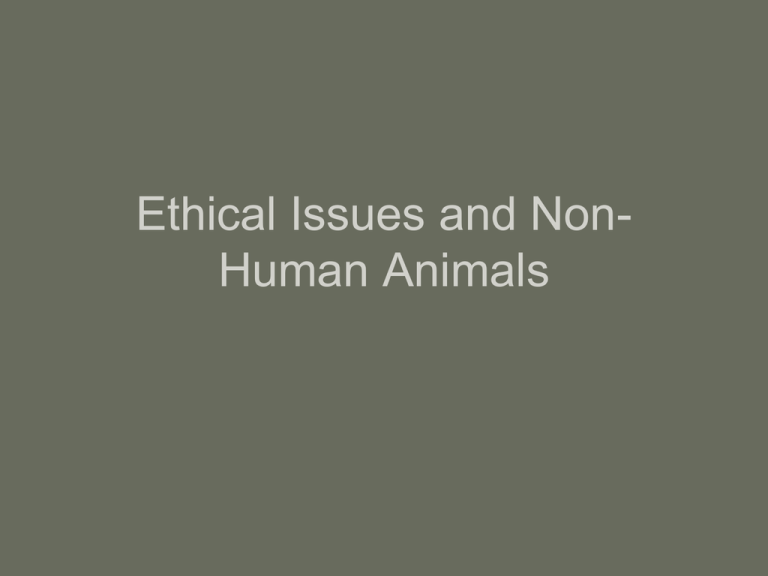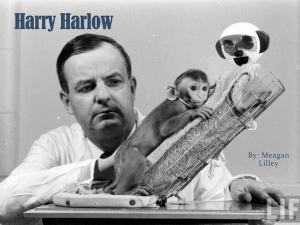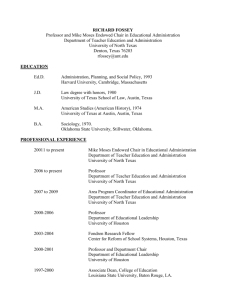Ethical Issues and Non-Human Animals
advertisement

Ethical Issues and NonHuman Animals Harlow’s Monkeys • Watch the following film, how would you decide if this experiment should be allowed in 2010? • http://www.youtube.com/watch?v=_O60TY AIgC4 Cost-Benefit Analysis? • That’s what an ethical committee would do…. • BUT • How do you decide which costs and which benefits are relevant? • Try and do one with a partner. Examples of research 1 Harlow(1959) • Harlow(1959) – The Origins of Love • Aim: to investigate the importance of contact comfort versus feeding in the healthy development of infants • Method: kept young rhesus monkeys in isolation to see if they preferred a “wire” or cloth mother. The monkeys were all psychologically damaged – unable to relate to other monkeys as adults. Examples of research 1 Harlow (1959) • Findings: that contact comfort was much more important than previously thought, which affected parenting practices significantly (eg babies were no longer left to cry at night) • SO – were these findings enough to justify the suffering of the monkeys? Examples of research 2 Gibson & Walk (1960) • Gibson & Walk (1960) The Visual Cliff • Aim: to investigate if depth perception is learned or innate. • Method: Used babies and young animals to see their reaction on being placed on the “visual cliff” as a control, some rats and kittens were reared in the dark. • Findings : most human infants cab discriminate depth by the time they can crawl. They were unable to conclusively answer their research question • SO – were the findings worth the sensory deprivation experienced by the young rats and kittens Examples of research 3 Dian Fossey (1983) • Dian Fossey (1983) on Gorillas’ social relationships • Aims to find out how gorillas organise themselves in groups • Method: Naturalistic Observation – she lived with the gorillas, fitting in with their background and carefully noting what happened • Findings: detailed information about gorilla hierarchies • SO – were the findings worth the gorillas having to put up with Dian Fossey hanging around for years? Examples of research 4 Jouvet (1967 • Jouvet(1967) REM Sleep deprivation research on cats • Aim: to discover the importance of REM sleep for animals (including humans) • Method: cats placed on upside-down flowerpots in a pool of water. If the went into REM sleep they would fall into the water. They learned to stay awake, but all animals eventually died. Examples of research 4 Jouvet (1967) • Findings: REM sleep is essential for survival in cats. • SO – was this research worth the deaths of these animals? SO WHY USE ANIMALS? • There are two main types of argument: • PRACTICAL REASONS – It is much EASIER to use animals than people. • ETHICAL reasons – these arguments focus on RIGHT and WRONG. • For exam purposes we will focus on ETHICAL reasons Arguments For Using Animals in Psychological Research • • Moral obligation to help humans before other animals (Gray 1987) – balance human benefit v animal suffering. Animals are well-protected by law eg “Animals (Scientific Procedures) Act” (1986) and the BPS Guidelines of 2008. Arguments For Using Animals in Psychological Research • • Animals are convenient to do research on, so we should try to use them (because Humans are WORTH MORE – which is a moral question). Animal research has given a lot to both practical and theoretical psychology – eg Learning Theory (Skinner’s rats and pigeons), Parental Deprivation (Harlow’s Monkeys) Arguments For Using Animals in Psychological Research • • • • Wider Benefit to Society We use animals when research on humans would not be possible So benefits to humans outweigh costs to the animals Animal Rights – animals have no responsibilities to society, so therefore don’t have any rights Arguments Against Using Animals in Psychological Research • • Animals suffer – which goes against their rights, often unjustifiably because the knowledge gained is relatively limited. Animals are qualitatively different (both physically and mentally) from humans, which makes it wrong for us to do research on them when it will only give limited insight into human behaviour. Arguments Against Using Animals in Psychological Research • • Singer(1991) argues that there is no justification in using animals for research and those who do are guilty of speciesism. He argues it is wrong to do research on any organism that can feel pain, because an animal’s pain is as important as human pain. Regan(1984) mature mammals are “the subject of a life” which has a value independent of any usefulness to others, and should be treated the same as humans Starter • In Pairs, split up the four studies below and write brief details about two each (5) • Harlow (1959) • Gibson and Walk (1960) • Jouvet (1967) • Fossey (1983) Starter (2) • Join with another pair and decide an order of ethical acceptability (1 most – 4 least) • Lay out your order on an empty desk, compare with another group Group essay task • Stick each research summary onto a separate A3 sheet • Group 1 – for each study make ethical arguments that support the researchers in doing the study. • Group 2 - for each study make ethical arguments that oppose the researchers in doing the study. • Refer to the bubble mark scheme to make sure that the essay will hit the top band Closer • Randomiser chooses judge • Each group puts up a 1 minute argument for /against a study • Judge decides • Winning team first out the door











